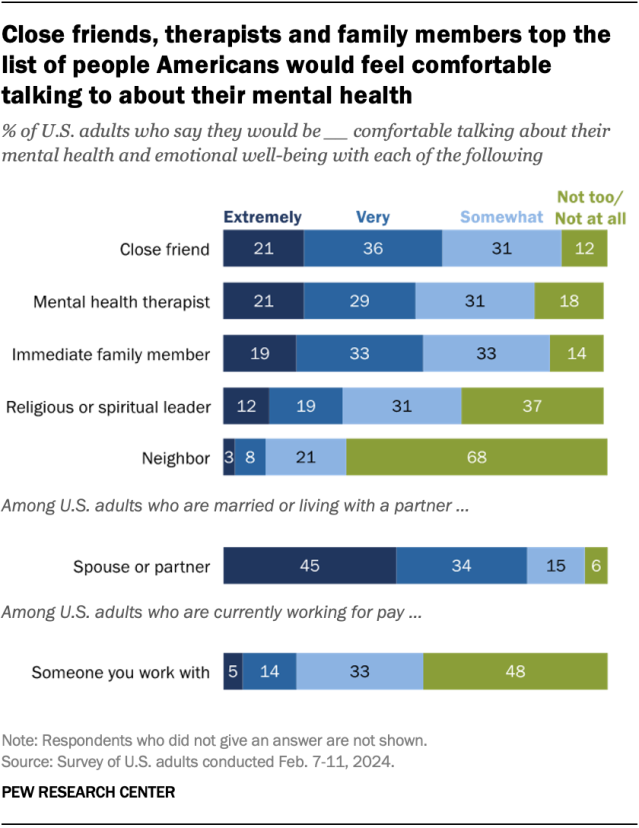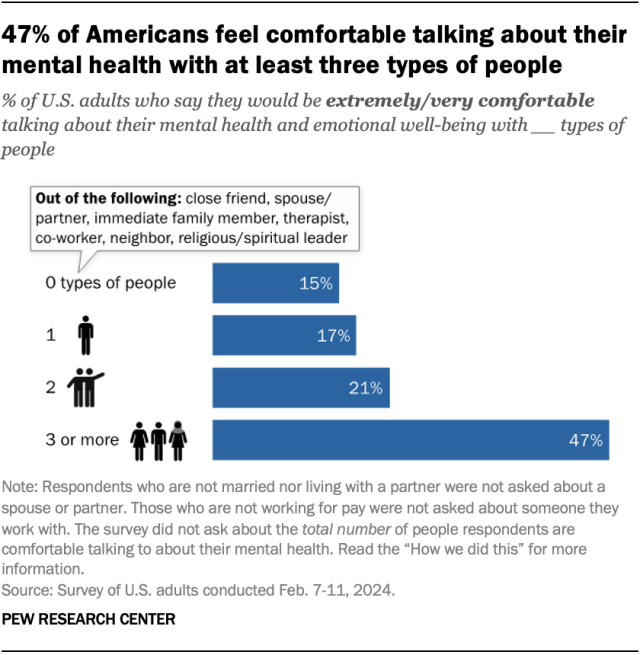Who do Americans feel comfortable talking to about their mental health?

Half or more of Americans say they are very comfortable or comfortable talking about their mental health with a close friend (57%), a close family member (52%) or a mental health professional (50 %), according to new Pew Research. Institutional research.
The Pew Research Center conducted this survey to understand who Americans feel most comfortable talking to about their mental health and emotional well-being. For this analysis, we surveyed 10,133 US adults from February 7 to February 11, 2024.
Each participant in the survey is a member of the Center’s American Trends Panel (ATP), an online survey panel recruited through national, random samples of residential addresses. In this way, almost all US adults have the opportunity to vote. The study is designed to be representative of US adults by gender, race, ethnicity, religion, education and other variables. Read more about the ATP process.
For this study, respondents who were single or living with a partner were not asked about their comfort in talking to a spouse or partner about their mental health and emotional well-being. Those who do not work for pay were not asked about the person they work with. Some items were asked of half the sample. See the above questionnaire below for details on survey management.
Here are the questions used in this test, along with the answers, and the test method.

In the United States, the importance of mental health and emotional well-being is becoming increasingly apparent, especially in light of the mental health challenges that many Americans are facing during the COVID-19 pandemic. . Health experts encourage people to turn to social media for support to cope with difficult life situations, so we asked US adults how they feel they can confide in their mental health.
However, not all Americans are comfortable talking about their mental health with people close to them or with professionals. Nearly three in ten US adults (31%) say they would be comfortable talking to a close friend about their mental health, and an additional 12% would not be comfortable once with this. The same sections say this about discussing mental health with a close family member or doctor.
When it comes to other people, Americans can open up about their mental health, comfort levels vary:
Some important ones they are considered a source of support for many people who are married or living with partners. Most of these Americans (79%) are very comfortable or comfortable talking about their mental health with their spouse or partner. This is the highest level of well-being among all the types of people we asked about.
However, this source of support is not available to all adults. About four in ten Americans say they are never married or living with a partner, while about six in ten say they are.
Americans who attend religious services often feel comfortable talking about their mental health leaders of the faith. Overall, 31% of US adults said they would feel very comfortable or comfortable talking about this with a spiritual or religious leader. But comfort is much higher among adults who report going to religious services at least once a week: 58% of people who go regularly would feel comfortable talking about their mental health with a religious leader.
Americans feel a lot uncomfortable talking about their mental health and colleagues or neighbors. Nearly half of working Americans (48%) say they would not feel uncomfortable or at all uncomfortable talking to a co-worker. And nearly two-thirds of Americans in general (68%) would not be comfortable talking about their mental health with a neighbor.
Modest differences by gender and age
We did not find significant differences in the comfort of talking about mental health by gender or age, although these factors are related to the likelihood of having certain mental health conditions.
For example, similar proportions of women (53%) and men (47%) say they are very comfortable or very comfortable talking to a doctor about their mental health. And women and men rank the seven sources of support included in the survey in the same order.
Differences are also moderate across age groups. Adults ages 18 to 29 and ages 65 and older provide similar comfort when talking about their mental health with a close friend, close family member, or doctor.
Social support network
Health experts say having diverse, supportive relationships can improve emotional well-being. Our research provides an integrated picture of the networks that Americans turn to to talk about mental health.

Conversely, nearly half of Americans (47%) say they are very comfortable or extremely comfortable having mental health conversations with three or more of the types of people included in the survey.
Conversely, 15% of Americans are very uncomfortable or uncomfortable talking about their mental health and any of the types of people we asked about.
Between these two extremes, 17% of Americans are comfortable talking about their mental health with only one type of person included in the survey, and 21% are comfortable doing so with two types of people.
The survey did not ask about the total number of people respondents are comfortable talking to about their mental health. Some respondents may be comfortable with one type of contact – such as a close friend – but may have more than one friend they feel comfortable talking to.
Single US adults are more likely than US adults to be uncomfortable talking about their mental health with any of the types of people we asked. Among single and cohabiting Americans, nearly a quarter (23%) are very uncomfortable or very uncomfortable talking about their mental health. any of people who asked about the survey. It is greater than the share of married or cohabiting Americans who give this answer (10%).
Note: Here are the questions used in this test, along with the answers, and the test method.
#Americans #feel #comfortable #talking #mental #health